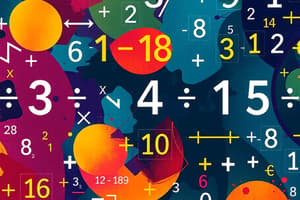Podcast
Questions and Answers
Which of the following is not a basic mathematical operation?
Which of the following is not a basic mathematical operation?
- Addition
- Subtraction
- Exponentiation (correct)
- Division
What type of number is '√2' ?
What type of number is '√2' ?
- Rational
- Whole
- Integer
- Irrational (correct)
Which of the following is an example of a quadratic equation?
Which of the following is an example of a quadratic equation?
- x^2 + 4x + 4 = 0 (correct)
- 2x + 3 = 7
- x + y = 5
- x^3 + 2x^2 - 5 = 0
What is the study of shapes, sizes, and positions of figures called?
What is the study of shapes, sizes, and positions of figures called?
Which trigonometric function relates the opposite side and the hypotenuse of a right-angled triangle?
Which trigonometric function relates the opposite side and the hypotenuse of a right-angled triangle?
What does differential calculus deal with?
What does differential calculus deal with?
Which of the following is a descriptive statistic?
Which of the following is a descriptive statistic?
Which of these is not a real number?
Which of these is not a real number?
Flashcards
Mathematics
Mathematics
A system of logic to quantify and describe the world.
Natural Numbers
Natural Numbers
Counting numbers: 1, 2, 3,...
Rational Numbers
Rational Numbers
Numbers expressed as a fraction p/q with integers p, q and q ≠ 0.
Algebra
Algebra
Signup and view all the flashcards
Quadratic Equations
Quadratic Equations
Signup and view all the flashcards
Trigonometric Functions
Trigonometric Functions
Signup and view all the flashcards
Calculus
Calculus
Signup and view all the flashcards
Statistics
Statistics
Signup and view all the flashcards
Study Notes
Fundamental Concepts
- Mathematics is a system of logic and abstract thought used to quantify and describe the world.
- It involves concepts like numbers, shapes, patterns, logic, and relationships.
- Basic mathematical operations include addition, subtraction, multiplication, and division.
- Mathematical reasoning helps to solve problems and draw conclusions.
Number Systems
- Natural numbers (also known as counting numbers): 1, 2, 3,...
- Whole numbers: 0, 1, 2, 3,...
- Integers: ..., -3, -2, -1, 0, 1, 2, 3,...
- Rational numbers: numbers that can be expressed as a fraction p/q where p and q are integers, and q is not zero.
- Irrational numbers: numbers that cannot be expressed as a fraction of two integers.
- Real numbers: the set of all rational and irrational numbers.
- Imaginary numbers: numbers involving the square root of -1, often denoted as i
Algebra
- Algebra uses symbols and variables to represent unknown quantities and relationships.
- Basic algebraic operations include simplifying expressions, solving equations, and manipulating formulas.
- Equations state that two expressions are equal e.g., 2x + 3 = 7
- Polynomials are algebraic expressions involving variables and coefficients.
- Quadratic equations are equations of the form ax2 + bx + c = 0.
Geometry
- Geometry is the study of shapes, sizes, positions, and properties of figures with different dimensions.
- Plane geometry deals with figures in a two-dimensional space.
- Solid geometry deals with figures in a three-dimensional space.
- Key concepts include lines, angles, triangles, quadrilaterals, circles, and volumes.
Trigonometry
- Trigonometry deals with relationships between angles and sides of triangles.
- Trigonometric functions like sine, cosine, and tangent describe these relationships.
- These relate angles to ratios of side lengths of the right-angled triangle.
Calculus
- Calculus involves finding instantaneous rates of change and areas under curves.
- Differential calculus deals with rates of change and slopes of curves.
- Integral calculus deals with areas and volumes.
- Fundamental concepts of calculus include derivatives and integrals.
Statistics
- Statistics involves collecting, analyzing, and interpreting data.
- Data sets can be descriptive (e.g., average, median) or involve more complex analysis of relationships.
- Statistical methods are used for making predictions, drawing conclusions, and testing hypotheses.
Discrete Mathematics
- Discrete mathematics deals with objects that can be counted.
- It includes areas like logic, set theory, graph theory, combinatorics, and number theory.
- These areas are frequently encountered in computer science and other fields.
Probability
- Probability deals with the likelihood of an event occurring.
- Probabilities range from 0 (impossible) to 1 (certain).
- Probability calculation is fundamental to many applications like insurance.
Studying That Suits You
Use AI to generate personalized quizzes and flashcards to suit your learning preferences.




